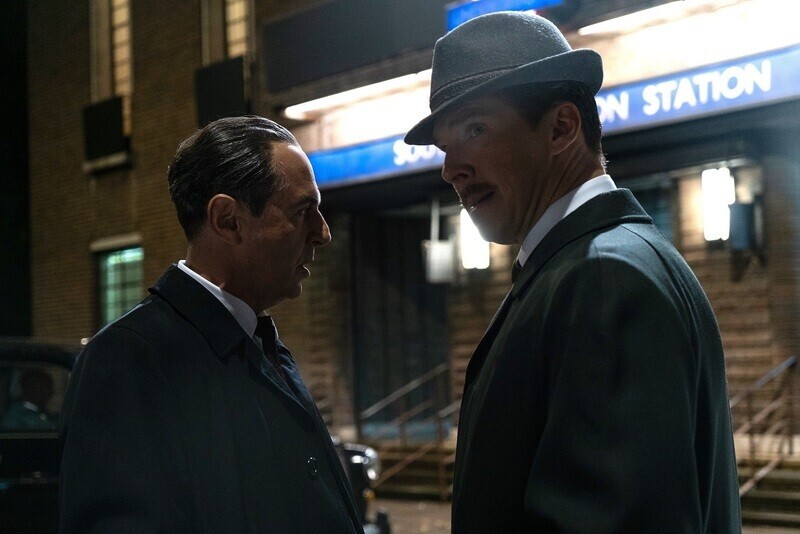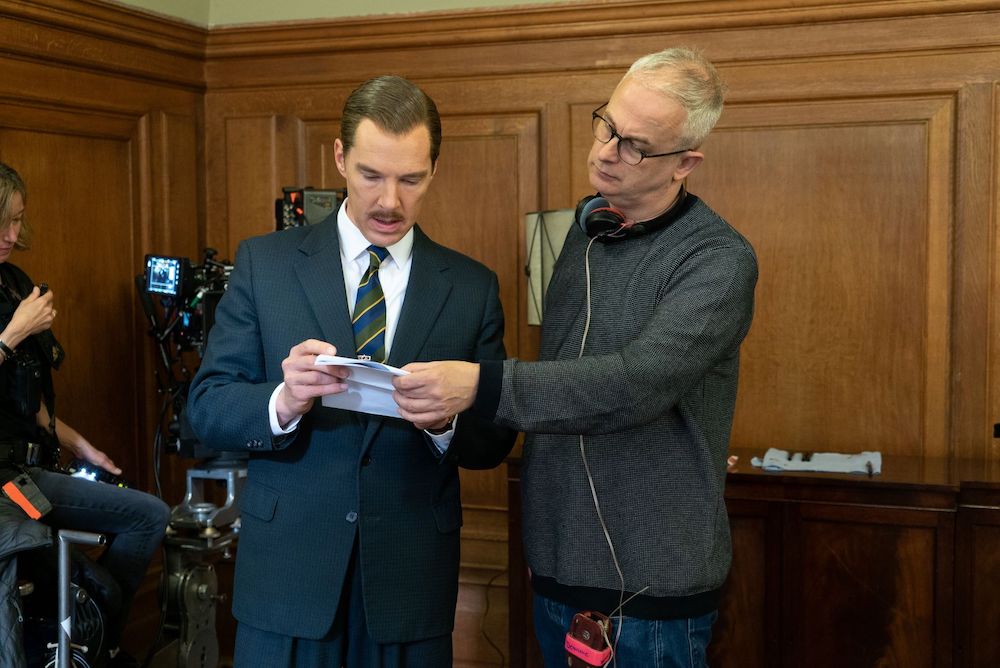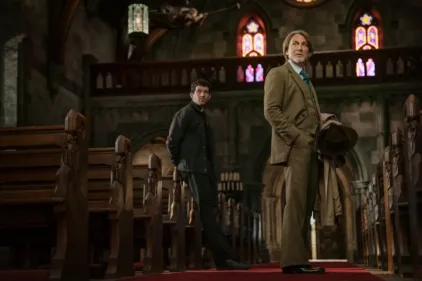In the midst of the Cold War, a top-ranking Soviet officer named Oleg Penkovsky feared that the risk of nuclear war was too great, and decided to share some of the most closely held secrets of the Soviet arsenal with the West. American and British intelligence agencies believed the safest courier for the information was an ordinary businessman, and so Greville Wynne became his liaison. “The Courier” is their story. In an interview, director Dominic Cooke talked about staying true not just to the look of the period but to its culture, which classic romantic drama inspired the tone of this film, and why he thinks Wynne was a hero.

How did you first hear the story about Greville Wynne and Oleg Penkovsky?
I have to be honest, and say that I didn’t know anything about them. I was sent the script and I started reading it without knowing the true story. I was gripped by what [screenwriter] Tom O'Connor has done. And then I looked it up and discovered it was a true story. And then once I found that out, I became quite obsessed by it and then started sort of going into resources, a vortex of research.
What did you discover in your research?
There’s a whole movie that could be made about what happened afterwards. Greville Wynne as you know from the movie was a regular guy. He was actually a working-class guy that married well. He was bright but he had terrible dyslexia. And he was held back in his education as a result. In those days they didn’t really make allowances for that. And consequently, it set him up in frustration which I think played out in terms of his ambition, a sort of watered ambition that found some sort of release in this mission. Anyway, they found him and they got him active on this sort of extraordinary mission. And then afterwards, he lost a lot of his business. So, he upped his profile as a celebrity.
Obviously, at that point, he was very famous, certainly, in the UK. It was a big news story. And I think what happened was that he sort of really pissed off MI6. Because he was putting himself out there all the time, going on chat shows and trying to turn himself into a bit of celebrity, writing books that were extremely fictionalized versions of what happened. They said, “Look, if you don’t stop, we’re going to withdraw your pension.” And he shut up. I think what happened was the result of that, the sort of story fell away from the public gaze. And the consequence was, you know, no one knows about it. People in my parents’ generation, and also sort of over the age of around 70, or 55, would remember him but younger than that, had no idea about him, or anything that he’d done.

One of the most powerful scenes in the film is when Wynne’s wife, played by Jessie Buckley, comes to visit him in prison. It is very emotional, very tense, and very theatrical, just two people talking in a room. But I thought, “This has to be the most English moment I have ever seen.” Everything was understated and subtext.
I think that’s very true. One of the issues in doing period film is the responsibility of capturing not just the look of the time but the way that people thought and the way they behave. There’s no point in doing a period film or period story on stage either if it’s not going to put the character actually internally into the world that most people would have been in at that time. You cannot just plunk contemporary behavior into the part because there’s sort of dishonesty about it.
And that was one of the things I was thinking about looking for when I was casting because not everyone can do that. Not everyone can, especially Brits, because the Brits, I mean, they’re still reserved. But if you go back to the Brits of that period, and I was born four years after the end of this, but I totally recognize it from my grandparents. The world I grew up in was unbelievably emotionally constipated, for want of a better word. I was looking for actors who could do that. Because it’s no good just playing that sort of surface is sort of reserved. And ultimately, a sort of weird British disapproval of displays of emotion, which I think is still there.
I think it sort of comes from running the Empire and having to pretend that everything’s alright when you’re actually being horribly cruel. And it gets filtered down from that, and through the public school system, even for those of us who have nothing to do with that system, because it is in the culture. So, I was really looking for that in casting and I found it. I mean, the revelation, the beginning of the journey, if you actually look at the gap between the actor and who they played is Jesse Buckley. Because Jesse is not British. She’s Irish. And she’s got a sort of wonderful warmth and openness. And yet, she would play this woman who was full of feeling but incredibly restrained, and that balance was there. We played with those dynamics all the way through the shoots. How much do you show? How much do you keep hidden? These people are still feeling the same things that we would be feeling now. Just showing emotion, expressing it externally was a sign of weakness. When we were shooting. We played with those levels throughout the film.
That’s what makes it seem so powerful. There’s a feeling of coded communication, which parallels the overall theme of the movie. And then there is so much more emotion in the last scene with Wynne and Penkovsky.
When I read the script, initially, my first thought was this is “Brief Encounter.” It is platonic. But it’s a love affair nonetheless, that is intensified by the secrecy surrounding it, and the fact that these two people can’t share what’s going on with anyone else. But there was, both in the film script and in the real story, an extraordinary bond between these two men. They helped each other evolve. Penkovsky transformed Wynne sense of who he was, and what he could be. Penkovsky was actually a real proper hero before beginning of the film. He sort of fought the Nazis off in Kiev, and was leading that and was decorated 13 times. And he really was a hero by anyone’s standards, and incredibly thwarted. He had a massive ego, incredibly thwarted by the system he grew up in with all sorts of hang-ups. But he was an extraordinary man. And they really did adore each other. And I think it was a very intense relationship.
So it’s a Russian and a Brit, very different cultures. I’ve spent quite a lot of time in Russia and Russians are sort of the opposite of Brits in that they express what they’re feeling in the moment and then it disappears. They move on to the next feeling.

We really feel immersed in the period watching the film. What details were especially important to you?
The locations were hard because we couldn’t shoot inside Russia. We were going to shoot in a couple of days in Minsk, in Belarus, which is an incredible place. It was rebuilt immediately after the Second World War, and it’s still got the 30-foot statue of Lenin. It really does conjure up that monolithic society in architecture. So, we were really keen to do that, and in the end, at the very last minute, we just couldn’t get the commitment from them to allow us to shoot.
The art directors were amazing. They went over to various Eastern Bloc countries with a large lorry and brought back all the authentic props. They did a huge amount of research to get it right, even the food. It was really carefully researched so that you could feel it from the inside. I didn’t want it to feel like a bunch of Westerners making an inaccurate film about Russia at the time.
We had to very reluctantly withdraw and do it all with blue screen in Prague. I actually visited Soviet Russia on a school trip in the early ’80s. It was such a vastly different culture; as soon as you landed there was the absence of advertising anywhere. The film shows how harsh and cruel that regime could be. But at the same time, I didn’t want to dehumanize those people. I wanted to show a system that with human beings who operate within that system, and not to turn them into caricatured “bad Russians.” or anything like that.
Do you consider Wynne a hero?
I do actually. He was a flawed human being like everyone. But he went beyond the call of duty. Obviously, at the beginning of the mission, he was kept in the dark for his own good, and just told to bring things back, which was quite a commitment to someone who’s never really done it before. As he went on, he took risks way beyond the call of duty. And he had incredible loyalty to Penkovsky, which I think is one of the things in the books that he wrote that rings true, an amazing admiration for Penkovsky. And I do think he had a really important role in the Cuban Missile Crisis, but also in giving access to the west and to lots of Soviet secrets, which was very helpful. I do think he’s a hero.












